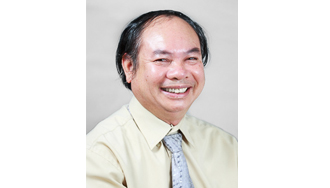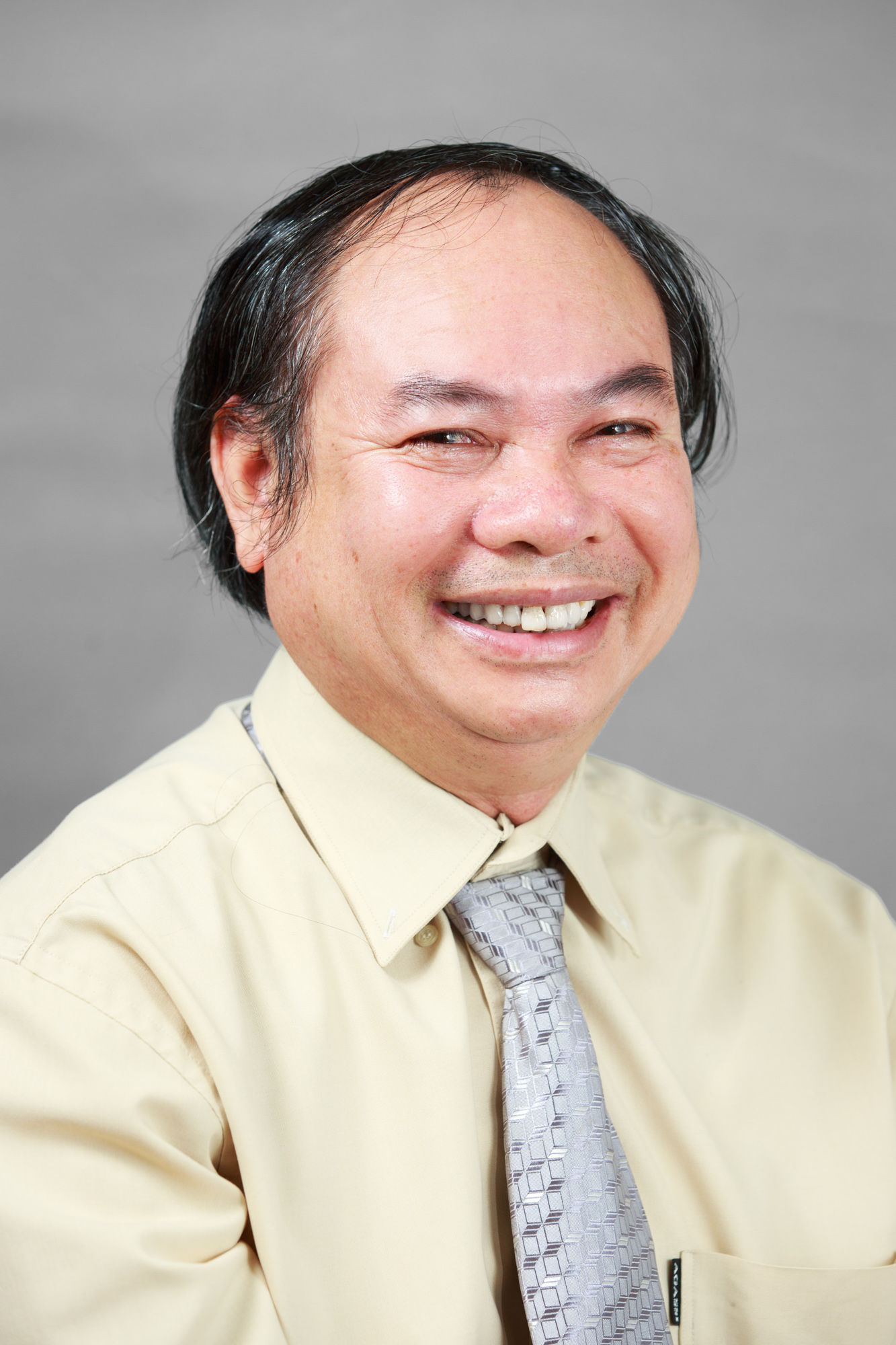
Students like Mr. Vu Van Thi belonged to the "one-time of fire" period of Hanoi University of Science. In 1972, when he had just become a first-year student of the Faculty of Literature, Mr. Thi temporarily put aside his bookish dreams and joined the army. For more than four years, he was an artillery soldier, then transferred to the position of radar operator of the missile corps, protecting the capital. In the same unit with him at that time were also Mr. Pham Gia Lam and Mr. Nguyen Ba Thanh. The story of the Literature students who became missile soldiers always surprised and admired us, the young generation. As for him, at that time, there was nothing but the thought of trying his best to complete the mission.
After the war ended in 1976, he returned to the school to continue his studies and graduated, and was assigned to the Vietnamese Language Department to teach Vietnamese to foreigners. Professor Hoang Trong Phien was the Head of the Department at that time, enthusiastically opening professional training classes, teaching English, and guiding the young generation to quickly mature in a completely new environment. In 1981, that is, just after graduating and working at the Vietnamese Language Department for less than a year, he was sent by the Ministry of Universities and Vocational Secondary Schools to Cambodia to teach Vietnamese at the Language School (now the Royal University of Phnom Penh). This was the first time the Ministry sent a delegation of cadres to Cambodia to teach. Going abroad to teach, it was strange, but also familiar. A lecturer - a former missile soldier, went to teach in a country that had just gone through a fierce period, poverty, and pain. Our country is also facing difficulties, the group of lecturers and staff are "equipped" with old suits taken from the warehouse of clothes usually rented for students studying abroad, to be called "decent". Lecturers' salaries still follow the domestic regime, they eat meals cooked like soldiers. Each room is also given an AK gun and a magazine for self-defense. Cambodian students are eager to study, the kind people love Vietnamese teachers. The feelings of people who have just experienced war, looking forward to a bright future, become empathy. Teachers also try to learn Cambodian language, customs and practices, and integrate into life with the people of the neighboring country. Students try hard to study, teachers are dedicated to teaching well. Teacher Vu Van Thi is one of the first people to write Vietnamese language teaching textbooks for Cambodia. He still remembers student Chorani, whose whole family died in the genocide regime, and he was saved by Vietnamese soldiers. After only 5 months, he was determined to learn Vietnamese very well, and wrote many letters to visit his teacher. Later, many more groups of lecturers from the Faculty went to Cambodia to teach. And like Mr. Thi, it was certainly an unforgettable time in the mind of each lecturer.

After returning to the faculty, he worked hard to improve his professional qualifications and taught Vietnamese abroad many times. In 1990, Mr. Thi was sent to attend a 5-month English course in the US. Immediately after this course, he was officially invited to teach Vietnamese for the summer course (SEASSI) at Cornell University, New York (USA), and then the following school year, he taught Vietnamese for the University of Washington, Seattle. He taught Vietnamese for Putra University, Malaysia (1997) and Chungwoon University, Korea (2005). He also attended a number of international conferences in the US, Korea, China, Thailand, the Philippines, Taiwan... During the process of interacting and teaching many foreigners who wanted to learn Vietnamese, he found many interesting points. In the early 90s, Americans and American students were very eager to learn Vietnamese and learn about the country and people of Vietnam. There are American students who have studied a lot of documents, then learned Vietnamese very well, the more they study, the more they have good feelings about Vietnam. After that, the source of students from Japan and Korea increased, at first for cultural exchange, later for business purposes, working in investment enterprises in Vietnam. Although they were sent to study for work purposes, students often have to make reports and comments on an issue about culture, social life, and Vietnamese people. Therefore, their needs are not simply to learn the language, but to have the fastest exchange and understanding of Vietnam and its people through lectures and teaching methods of lecturers. It is these requirements that create the driving force for innovation and development of the Faculty and each lecturer as a bridge connecting cultures.
In 2006, as the Head of the Department of Vietnamese Language and Culture for Foreigners, he and the Faculty focused on building a new training program, the Vietnamese Studies Program, and at the same time changed the name of the Faculty to the Department of Vietnamese Studies and Language. Advanced countries in the region and in the world such as Germany, the US, Korea, and Japan all have departments and research centers on Vietnamese Studies. The Department of Vietnamese Studies and Language represents the continuation of the tradition of more than 45 years of construction and development, while at the same time posing new requirements for in-depth investment, linking theory with practice. Learning Vietnamese in practice on the basis of a solid foundation of Vietnamese Studies and through Vietnamese to introduce Vietnam to international friends.
Regarding the training of Vietnamese studies, Mr. Vu Van Thi also has many concerns. The Vietnamese studies program started in 2010, two training courses have passed with more than 100 graduates. The Faculty has also received the transfer of the Vietnamese studies master program from the Institute of Vietnamese Studies and Development, and started recruiting the first Master of Vietnamese studies course at the Faculty in 2015. The Vietnamese studies training program for foreigners is also attracting more and more students. This is a broad research field, highly interdisciplinary in nature. In teaching practice, many times Vietnamese students and especially international students raise questions about sensitive issues of life. Teachers need to provide reasonable explanations. He is enthusiastic about the idea of teaching the subject of Contemporary Vietnamese Society with current issues that must always be updated and thoroughly explained such as ethnic issues, seas and islands, cultural adaptation, development trends, etc.
Mr. Thi compiled many textbooks and reference books, not only contributing to the general document system of the Faculty but also participating with other educational, media and cultural organizations. He wrote the book Basic Vietnamese, 2006. This is one of the best Vietnamese teaching books to date. Not only in Vietnam, the book is also used as a Vietnamese teaching textbook for some universities abroad such as: Putra University, Malaysia, Chungwoon University, Korea, Seoul University of Foreign Studies, Korea. He participated in compiling Vietnamese teaching books for overseas Vietnamese of the Ministry of Education and Training. That book is Que Viet, including 9 books: 3 Vietnamese teaching books, 3 exercise books and 3 teacher guides. He has participated in several training programs on teaching Vietnamese for Vietnamese teachers in France, Thailand and several domestic programs of the Ministry of Education and Training, and participated in two Vietnamese teaching programs for the Voice of Vietnam, namely Speak Vietnamese and Vietnamese for Tourism.
The teacher shared that Vietnamese language teaching books, like those for other languages, will become outdated after a while and need to be constantly updated. The system of textbooks and lectures of the Faculty, after opening more majors and training levels, is being focused on supplementing, completing and upgrading. According to the teacher, the method of teaching Vietnamese to foreigners today has had many positive changes, from scholastic to focusing more on developing listening and speaking skills. Previously, foreigners learning Vietnamese often said "storms are not as bad as Vietnamese grammar". To teach well, lecturers need to prepare good textbooks and lectures, and new courses are really effective. The teacher shared that the Faculty has long implemented a teaching method for foreign students to be able to read Vietnamese fluently, after only 9-12 lessons, and he wants to widely popularize this method to save time for learners. Mr. Thi also has the idea of building a Vietnamese language proficiency assessment program that meets international standards like TOEFL and IELTS of English, which is managed by the Faculty. In addition, building an applied linguistics major is very necessary for the Vietnamese language training program for foreigners as well as training Vietnamese language teachers, meeting the great needs of society.
The staff and lecturers of the Faculty of Vietnamese Studies and Vietnamese Language are continuing to unite and make efforts to develop the Faculty to be stronger in stature and prestige. He hopes that the Faculty will build a PhD training program in Vietnamese Studies. In the future, the Faculty will not only be a training center but also an international Vietnamese language proficiency testing center, an international Vietnamese language teacher training center, and a strong research center on Vietnamese Studies. There is still much to do and on that path of development, Associate Professor, Dr. Vu Van Thi is still quietly joining hands with his colleagues.
Author:MSc. Nguyen Thi Kim Hue, MSc. Le Thu Ha